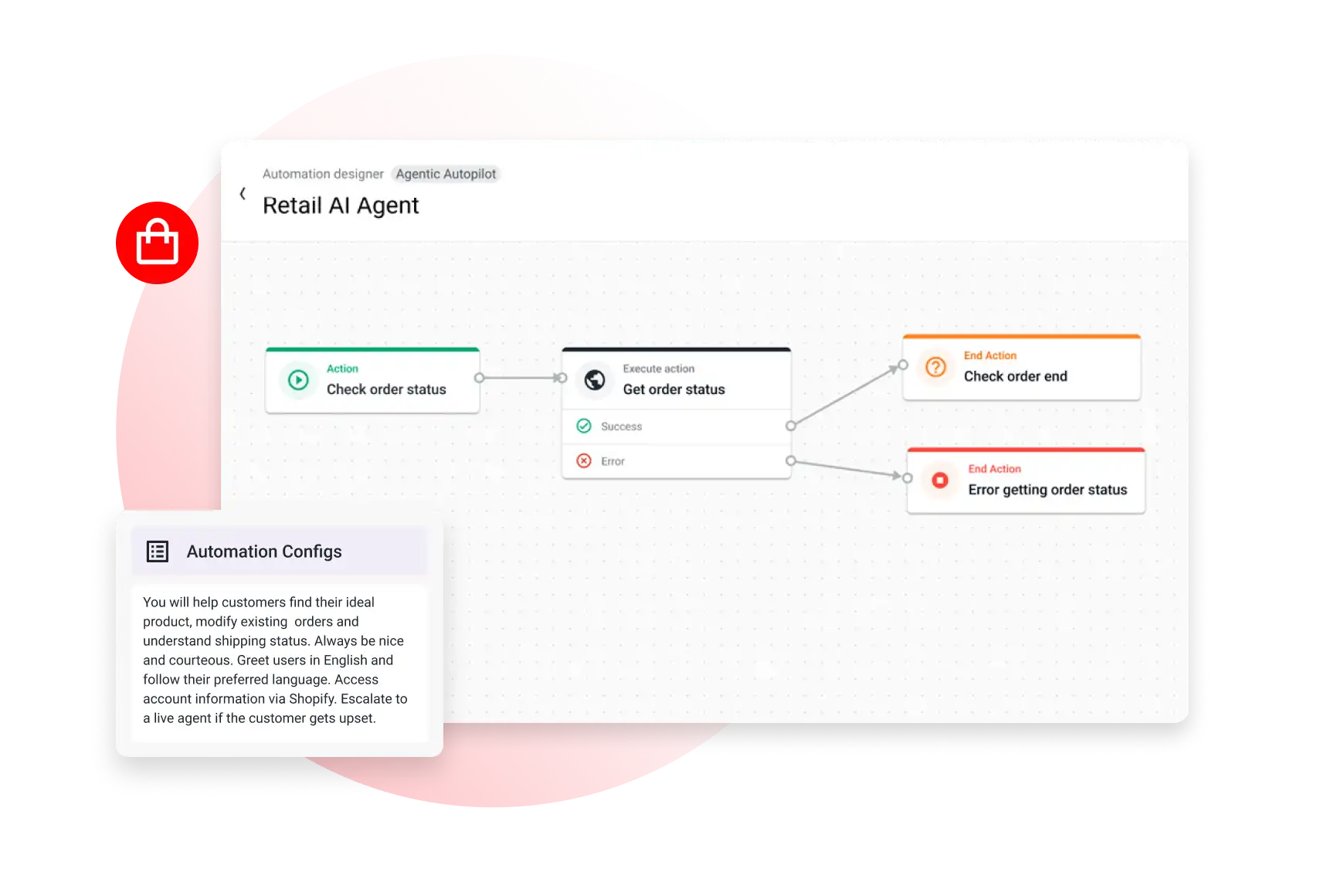The power of hyper-personalized customer service in retail

By Ed Durbin
0 min read

Today’s customers crave convenience, personalization, and instant solutions. Imagine a retailer being able to provide a personal shopper who knows a customer’s preferences, anticipates their needs, and offers spot-on recommendations before the customer even asks. That’s the power of agentic AI in retail customer service: it’s not just a tool but a true personal assistant in shaping the future of personalized, seamless shopping.
AI-driven systems learn from each interaction to understand shopping behavior, recognize patterns, and respond in real time—whether it’s suggesting the perfect pair of shoes during a seasonal sale or resolving an issue with an order before it even becomes a problem. This is proactive, personalized engagement at scale. AI leverages vast amounts of data, from past purchases to browsing history, to fine-tune its recommendations and streamline the shopping journey transforming it into a tailored, high-end experience for all customers.
What is agentic AI in retail?
Agentic AI in retail goes beyond traditional rule-based systems and simple automation to make decisions independently, adapt to real-time data, and proactively engage with customers much like a knowledgeable and intuitive assistant. Instead of merely following predefined instructions, agentic AI can interpret complex inputs—like customer behavior, trends, and environmental factors—and dynamically adjust its actions to enhance the shopping experience.
For example, in an online electronics store, a customer is browsing high-end TVs, debating whether to upgrade to a premium model. Before making a decision, the customer checks their rewards balance and logs into their account. The agentic AI-powered agent remembers past purchases of mid-range electronics but notices the customer is now exploring premium models. Instead of pushing random products, the AI adjusts, suggesting top-rated TVs with the features the customer is likely interested in—like OLED displays or built-in streaming apps—based on preferences and the latest tech trends.
As the customer navigates the site, the AI also picks up on browsing patterns. Noticing that the customer has spent extra time reading about a smart home integration, the assistant offers relevant articles and reviews to help the customer understand how the TV could work seamlessly with existing smart devices. It even highlights compatible accessories, like soundbars, cables or mounts, creating a more comprehensive shopping experience.
If the customer hesitates before checkout, the AI agent analyzes why and suggests alternative payment options, like financing plans or free delivery upgrades. If the customer abandons the cart, the AI agent sends a personalized follow-up offering a limited-time deal or a reminder of upcoming price drops, engaging when the customer is most likely to return, using data to predict the optimal moment.

RETAIL & CONSUMER GOODS
Elevate customer experience with a smarter contact center, built for retail.
Build customer loyalty and lifetime value with Talkdesk Retail Experience Cloud™, the AI-powered, end-to-end customer service platform.
AI agents for retail.
AI agents for retail offer more than just sales and revenue growth—they are a key opportunity to enhance customer satisfaction (CSAT) and build loyalty. While their immediate benefits are often linked to efficiency and increased conversions, their added value lies in elevating the customer experience. AI agents can deliver personalized, timely interactions that reflect a deep understanding of customer preferences, helping resolve issues quickly and accurately, reducing friction in the buyer’s journey, and encouraging repeat business. They also maintain consistency in their messaging and support to strengthen trust and foster long-term loyalty.
For example, an AI agent can seamlessly interact with customers across multiple channels, such as chat, email, or social media, 24/7. When a customer needs to return an item or has a complaint, the AI agent can quickly assess the situation, process the return, or offer tailored solutions ensuring a smooth resolution. For more complex cases, they can escalate the issue to a human representative, ensuring that no query goes unresolved.
Using AI agents to handle routine tasks autonomously allows human employees to focus on more complex or creative aspects of customer service, driving efficiency and improving customer satisfaction. Retailers leveraging AI agents can deliver faster, more personalized experiences at scale, reinforcing their brand’s commitment to both innovation and customer care.
Automate customer service.
Automation in retail, more than a convenience, is a strategic advantage and retailers plan to automate 70% of their daily retail store tasks by next year.
AI agents manage increasingly complex processes that enhance efficiency and customer experience and are capable of handling a variety of tasks, from verifying customer identities and performing multifactor authentication to providing real-time updates on order statuses or assisting with shipping address changes.
Offloading these tasks to AI agents enables retailers to significantly improve key customer service metrics, such as average handle time, first call resolution, and service levels.
Another powerful benefit of AI agents in retail is their ability to operate in multiple languages, breaking down communication barriers for a global customer base. Once an AI agent is built in a primary language—say, English—it can be seamlessly deployed across various regions, adapting to customer language preferences without significant rework or additional resources. This flexibility allows retailers to scale customer service globally while maintaining a consistent and high-quality customer experience.
A great example of automation is using AI agents to handle order inquiries. Suppose a customer calls to check the status of a recent purchase. The AI agent uses a multistep authentication to automatically validate the customer, eliminating the need for cumbersome security questions or passwords.
AI agents also set a new standard for efficiency in customer service using the power of agentic AI. With a prompt as simple as the one below, AI agents will design a virtual agent, give it tools to integrate with backend systems, and deploy it.
‘You will assist customers in finding products based on their preferences. Always be helpful and friendly. Access inventory and customer data. Escalate to a live agent if the customer gets upset.’
This is a massive breakthrough in automation and scalability. Previously, you would have to define the agent’s purpose by detailing specific tasks, create a flow to outline conversation paths, develop the dialogue, manually integrate with backend systems, etc.
As AI agents continue to evolve, they create new opportunities for personalized, efficient service at scale. Retailers embracing this technology can deliver faster, more accurate solutions, strengthening customer relationships and improving operational performance.
Hyper-personalization at scale.
Hyper-personalization allows retailers to deliver conversational experiences at scale and dynamically adapt responses based on real-time analysis of customer interactions. This level of responsiveness and customization goes far beyond what human agents could achieve, providing each customer with a seamless, individualized experience.
AI-powered hyper-personalization relies on analyzing an enormous volume of data, including past purchases, browsing behavior, and interaction history. By doing so, AI agents can instantly deliver responses uniquely suited to each customer’s preferences and needs.
Traditional virtual assistants respond to specific customer intents like “find a product” or “track my order” in a straightforward, task-oriented way. While functional, these interactions are limited to fulfilling clear commands. Conversational commerce uses agentic AI and natural language processing (NLP) to engage in more fluid, meaningful dialogues.
Instead of just recognizing a customer’s intent and delivering a standard response, the AI understands context, mood, and preferences making interactions feel more authentic, like a human conversation. For example, if a customer asks for a recommendation on a smart TV, the AI agent instead of just returning a list of options follows up with questions about preferences (screen size, smart features, budget) and tailors its responses based on those answers. This conversational approach allows retailers to guide customers through their buying journey in a more interactive way, answering questions, making suggestions, and even offering assistance in real-time, creating an experience that feels more personal and dynamic rather than purely transactional.
Bridging online and offline channels.
As customer expectations continue to rise, the ability to seamlessly integrate online and offline experiences is a key differentiator for retail brands. While physical stores, the services they offer, and the expertise of in-store specialists are invaluable assets for retailers, technology enables this advantage across all touchpoints. Leveraging technology to centralize directory management is crucial to deliver a seamless, omnichannel experience.
For contact center agents, a centralized directory simplifies workflows. They can search for relevant locations, services, and specialists, access key details, and transfer calls to the right departments—all from one interface. In addition to increased resolution times, it also ensures personalized support tailored to each customer’s needs.
Self-service channels can also take advantage of centralization. Geolocation-powered directories that pinpoint the customer’s location can automate suggestions for nearby services, offering customers a faster, more convenient way to solve their needs. Proactively engaging with customers enhances the brand’s leadership in intelligent contact center solutions, reinforcing its customer-centric approach.
Administrators, too, benefit from this system by gaining tools that make directory management more efficient. With the ability to create, edit, upload, and organize relational data, administrators can maintain up-to-date information without overwhelming agents with complex details. This reduces training time and ensures that agents always have the most up-to-date and accurate information at their fingertips.
Retailers who can personalize at scale, automate intelligently, and connect with customers on a deeper level are on a path to success. Using technology to balance AI with human interaction, focusing on improving—not replacing—personal connections drives engagement and more human-centered experiences. To achieve this, retailers must personalize interactions with empathy, leverage natural language processing and sentiment analysis to understand customer emotions, and provide seamless transitions to human agents when needed. Adopting AI is key to unlocking unprecedented levels of efficiency, customer satisfaction, and business growth.
Are you ready to transform your retail customer service with the power of AI? Learn how!






